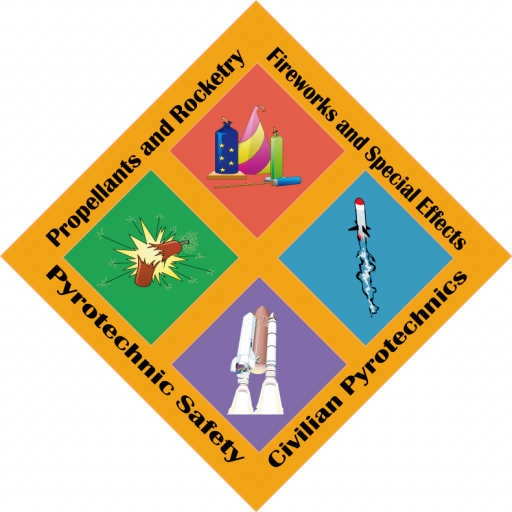Georg Steinhauser, Karina Tarantik and Thomas M. Klapötke Abstract: Copper compounds play a key role in the development of “greener” pyrotechnics by substitution of noxious barium compounds from green colored effects. The application of many copper(ii) compounds in pyrotechnics is limited because of their noble and often hygroscopic character. We have investigated nitratocuprates(ii) as well …
Continue reading Copper in Pyrotechnics
Category:JPyro – Articles
The main category – things that are published in the Journal
ESI for JPyro, 26, 2007, p24
Ignition and Combustion of Aluminium in High Explosives Attached are three SEM-images of the aluminium powder used in the study at different resolutions Please download the ESI to the original article below Note: Downloads of errata and supplementary materials are free Click here to return to original paper: Ignition and Combustion of Aluminium in High Explosives
Thermal Stability of Hydrazinium Nitroformate (HNF) Assessed by Heat Generation Rate and Heat Generation and Mass Loss
Manfred A. Bohn Abstract: HNF, hydrazinium nitroformate, H3NNH2 +·C(NO2)3−, is a water soluble salt. It has a positive oxygen balance of 13%, a much more positive enthalpy of formation than ammonium perchlorate (AP) and amuch higher heat of explosion than AP, 5579 J g−1 against 1972 J g−1. Additionally it has no chlorine and all …
Continue reading Thermal Stability of Hydrazinium Nitroformate (HNF) Assessed by Heat Generation Rate and Heat Generation and Mass Loss
Synthesis, Structural and Reactive Characterization of Miscellaneous Nanothermites
Denis Spitzer and Marc Comet Abstract: In this paper, we report the elaboration and the characterization of several kinds of nanothermites made at the French German Research Institute of Saint‑Louis (ISL). Three types of materials are presented herein: tungsten trioxide based nanothermites obtained by physical mixing of this metallic oxide withaluminum nanoparticles; tungsten trioxide based …
Continue reading Synthesis, Structural and Reactive Characterization of Miscellaneous Nanothermites
Laser Diode Ignition of Pyrotechnic Mixtures: Experimental and Numerical Studies
Pr Philippe Gillard Abstract: An experimental study of laser ignition of Zr/KClO4, Zr/PbCrO4, Fe/KClO4, Fe/KNO3, B/KClO4 and B/KNO3 mixtures is presented in this paper. The ignition system is composed of two lenses which focus the laser beam on the tablet. A sapphire porthole, juxtaposed with the pyrotechnic composition, protects the optical unit but causes losses …
Continue reading Laser Diode Ignition of Pyrotechnic Mixtures: Experimental and Numerical Studies
Ignition And Burning Rate Characteristics Of Pyrolant Black Powder
Takuo Kuwahara Abstract: Composite propellants contain binder as fuel which connects oxidizer particles and metals. The burning rate of a propellant is affected by the concentration and type of binder. Pyrolant is mixed with oxidizer particles and metal particles. Pyrolant does not contain binder, so burns smoothly. The burning rate of black powder (BP) which …
Continue reading Ignition And Burning Rate Characteristics Of Pyrolant Black Powder
Ignition and Combustion of Aluminium in High Explosives
Arno Hahma Abstract: Ignition and combustion properties of aluminium powder up to 250 kbar pressure were successfully determined. Hydrodynamic modelling combined with parametrized reaction profiles was used to match the experimental metal plate profiles to calculated values and the metal reactivity was determined from the parameters thus obtained. The reaction profiles over a wide range …
Continue reading Ignition and Combustion of Aluminium in High Explosives
5th Workshop on Pyrotechnic Combustion Mechanisms, held October 6th 2007 in Beane, France
Ernst-Christian Kocha and Rutger Webbb For the fifth time the “Workshop on Pyrotechnic Combustion Mechanisms” was held and organized in conjunction with the International Pyrotechnics Seminar. This time it was the 34th IPS Seminar in conjunction with EUROPYRO 2007, in Beaune, France. This workshop had a total of 21 participants, of which 4 were from …
Continue reading 5th Workshop on Pyrotechnic Combustion Mechanisms, held October 6th 2007 in Beane, France
Atmospheric Flight Dynamic Simulation Modeling Of Spin-Stabilized Projectiles And Small Bullets With Constant Aerodynamic Coefficients
Dimitrios N. Gkritzapis, EliasE. Panagiotopoulos, Dionissios P.Margarisb and Dimitrios G.Papanikas Abstract: A full six degrees of freedom (6-DOF) simulation flight dynamics model is applied for the accurate prediction of short and long range trajectories of high and low spin-stabilized projectiles and small bullets via atmospheric flight to final impact point. The projectile is assumed to …
Continue reading Atmospheric Flight Dynamic Simulation Modeling Of Spin-Stabilized Projectiles And Small Bullets With Constant Aerodynamic Coefficients
Atmospheric Flight Dynamic Simulation Modeling Of Spin-Stabilized Projectiles
Dimitrios N. Gkritzapis, Elias E. Panagiotopoulos, Dionissios P. Margarisb and Dimitrios G. Papanikas Abstract: A full six degrees of freedom (6-DOF) simulation flight dynamics model is applied for the accurate prediction of short and long range trajectories of high and low spin-stabilized projectiles and small bullets via atmospheric flight to final impact point. The projectile …
Continue reading Atmospheric Flight Dynamic Simulation Modeling Of Spin-Stabilized Projectiles
